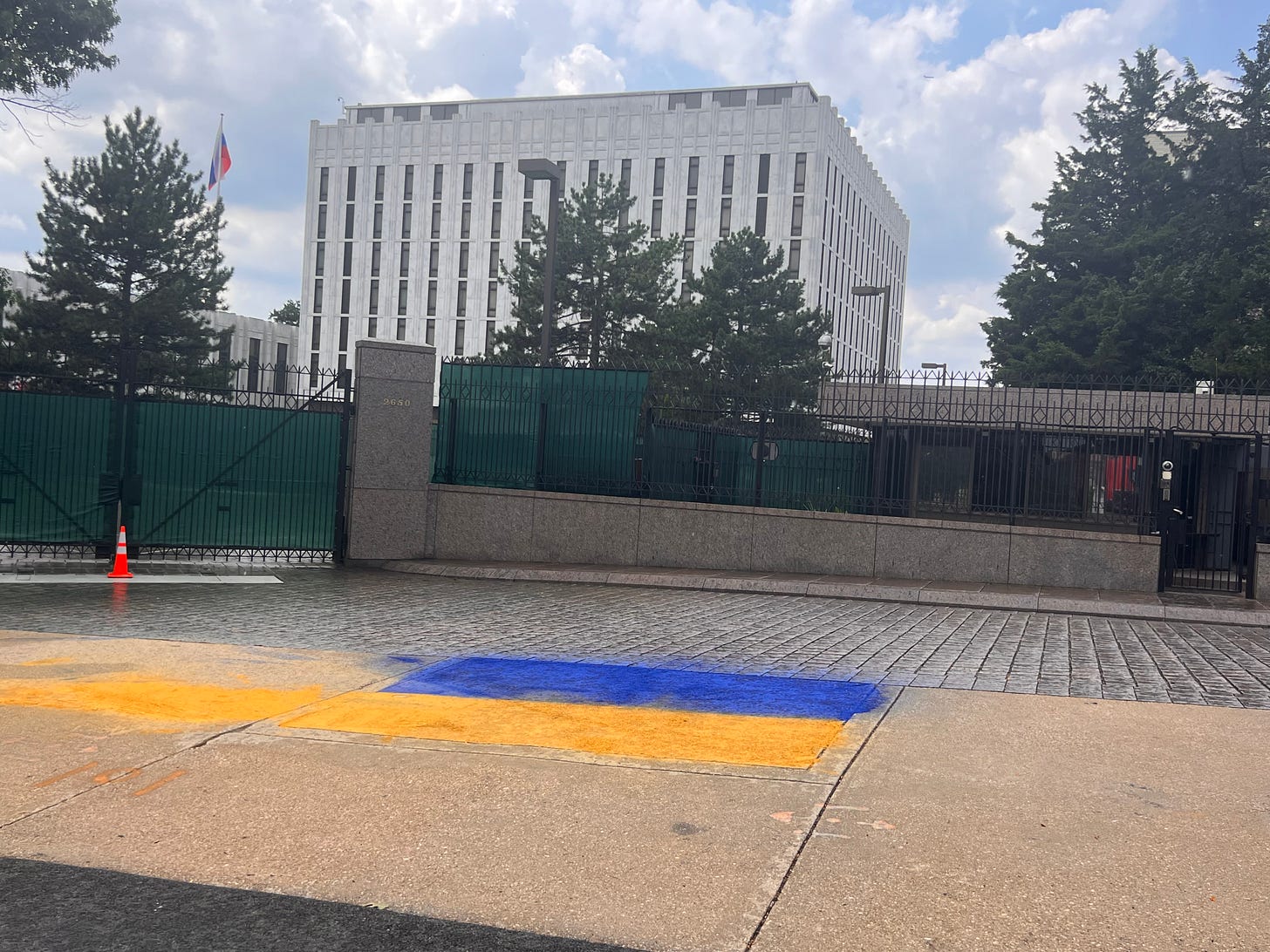A Boy Can Dream, Can't He?
ChatGPT augments my reality
Good Morning:
Okay, yeah, it’s AI-generated. But what the hell are these large language models good for if not making my dreams into a reality with which the United States Secret Service cannot interfere. He’s the original photo, unmodified photo:
On a cuter, note, a family of mischief sprites decided to test the Secret Service’s new view that sidewalk chalk on public sidewalks violates a D.C. municipal ordinance against defacing public property and thus bans hopscotch.
This was the subject of my The Situation column, over the weekend:
A few aspects of the encounter strike me as worth highlighting, less because of anything to do with the Alaska summit—the reason I was there—than because of the state of policing in Washington, D.C.:
The first is that the rules had changed. What was obviously legal last year was suddenly verboten. Something I had done in active consultation with the Secret Service only a few months ago was now an arrestable offense. There was no explanation. When I asked the lead officer about it point blank, he responded that he hadn’t been here and his commanders apparently hadn’t been at the helm that day. I don’t doubt his good faith. Truly. But I also don’t believe this is the full story, whether he knows it or not. In the past, the Secret Service has shown up at my operations, verified that they are not threatening, and then stood down. Sometimes they have even stayed to protect my rights. They have never shut down one of my protest operations, let alone read a law aggressively to do so.
The second point is that this rule change happened without any change of law. The written law is the same as it was last year. I can’t imagine what the term “reliance interest” means if it doesn’t mean that if you specifically vet conduct with law enforcement and they express no problem with it, you can count on them regarding it as untroubling.
The third point is that the Secret Service was now policing a D.C. municipal ordinance that it was interpreting—as the D.C. police have not, in my experience—to forbid drawing with chalk on the sidewalk. It is hard for me to think of a greater degradation of federal law enforcement than sending uniformed Secret Service to prevent sidewalk chalking.
Writes the adult mischief sprite: “We took a little family outing this afternoon to test out the consistency of new DC chalk restrictions. The sunflowers should look familiar. No interactions with law enforcement.”



I don’t want to encourage anyone to break municipal law, but I don’t exactly want to discourage anyone either from drawing joyful pro-Ukrainian images on sidewalks citywide either.
Also, a thought: To the extent DC law can be interpreted to prohibit chalking a public sidewalk and that this interpretation as applied to peaceful political protests can be reconciled with the First Amendment (and the DC Circuit says it can), shouldn’t the DC City Council consider changing the law to clarify that harmless, temporary beautifications of streets and sidewalks using calcium carbonate by children and political protesters do not constitute “defacement”?
Just asking.
Friday on #DogShirtTV, an exceptionally revolutionary show! The estimable Fred Jacobs, a member of the Greek Chorus who has never before appeared on screen but whom I knew in a previous life, popped up on the show with detailed research on the legalities around the American acceptance of the Statue of Liberty, as a comparison to Trump taking that Qatari jet.
Great work, Fred, come back soon!
Friday On Lawfare
Compiled by the estimable Mary Ford
Past Pocket Rescissions Are Not Precedents for Power Vought Claims
Cerin Lindgrensavage and William Ford evaluate Director of Office of Management and Budget Russell Vought’s claims that the executive has sweeping authority to “pocket rescind” funds—that is, cut federal funding without receiving congressional approval. Lindgrensavage and Ford analyze how Congress fought back against pocket rescissions during the Ford and Carter administrations and emphasize that Congress should look to precedent to stop Vought’s abuses and protect its power of the purse.
Although the text of the ICA itself precludes the need to consult past practice to decide whether the president may rely on the act’s procedures to withhold funds through their date of expiration, a closer look at the historical examples cited by the Trump OMB in the past illustrates the extent to which Vought’s proposal deviates from past presidential practice, and provides some helpful precedent to guide Congress in responding to this attempt to steal its power of the purse.
Whack-a-Mole No More: How Extremists Choose Their Digital Safe Havens
Mariana Olaizola Rosenblat reviews Tamar Mitts’s book entitled, “Safe Havens for Hate: The Challenge of Moderating Online Extremism,” and argues that Mitts thoroughly diagnoses the problem, but methodological oversimplifications—namely her measure of platforms’ moderation thresholds—render her work an important, but not authoritative, source on extremist platform migration.
In the end, “Safe Havens for Hate” is not the final word on extremist platform migration, nor does it pretend to be. Its strength lies in pairing an ambitious dataset with vivid case studies to illuminate a problem that is often discussed but rarely mapped in this much detail. Its shortcomings—narrow regulatory framing, methodological simplifications, and thin policy prescriptions—should be read not as fatal flaws but as invitations for the next round of scholarship. If Mitts’s goal was to move the conversation beyond metaphors and toward patterns we can actually measure, she has succeeded. The next challenge is to turn those measurements into sound policy strategies.
Drug Cartels Are the New APTs
In the latest edition of the Seriously Risky Business cybersecurity newsletter, Tom Uren discusses the hack of the federal judiciary’s electronic case filing system, Microsoft Azure’s data privacy scandal, and how much espionage disruption has cost Australia.
Last week, Politico reported the electronic case filing system used by the federal judiciary had been breached in a "sweeping cyber intrusion". Hackers breached the Case Management/Electronic Case Files (CM/ECF) system that legal professionals use to upload and manage case documents. They also breached PACER, the system that gives the public limited access to some of the same data.
Podcasts
On Lawfare Daily and Scaling Laws, Dean Ball joins Kevin Frazier and Alan Rozenshtein to discuss the White House’s Artificial Intelligence (AI) Action Plan, the challenges of implementing federal AI policy, and the right’s evolving attitudes toward AI.
Documents
Mary Ford shares the text of the District of Columbia’s federal lawsuit challenging the Trump administration's attempts to seize control of the Metropolitan Police Department.
Videos
On August 15 at 4 pm ET, I sat down with Anna Bower, Roger Parloff, and Chris Mirasola to discuss President Trump deploying the D.C. National Guard, the bench trial in Newsom v. Trump, and foreign aid litigation updates.
Today’s #BeastOfTheDay is a sea snake coming by for a visit:
In honor of today’s Beast, wave to passersby.
Keep reading with a 7-day free trial
Subscribe to Dog Shirt Daily to keep reading this post and get 7 days of free access to the full post archives.






